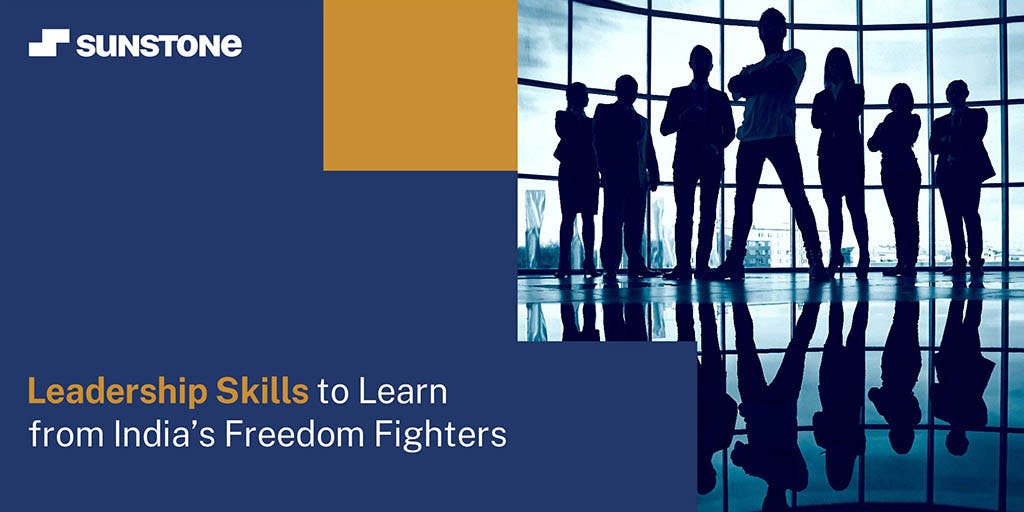5800 students unlocked their dream jobs with UG/PG programs in top colleges. Apply Now!
What does it take to overthrow 200 years of colonial rule and gain independence? Is it determination? Foresight? Planning and commitment? It’s all this and more. The Indian freedom struggle, spanning nearly a century, culminated in the country’s independence from the British in 1947. Millions across the country participated in the struggle and many laid down their lives. They were inspired and guided by generations of freedom fighters who demonstrated leadership skills that are critical for success even today.
Here are four important leadership skills you can learn from the Indian freedom fighters to excel at work and in life:
1. Critical Thinking
The first step in the movement for freedom was making an argument for India’s freedom. Over nearly two centuries, the British had promoted the idea that their rule was good, even justified; and many Indians had come to agree with this argument. Freedom fighters used their critical thinking and logical reasoning skills to refute these arguments and identify the myriad problems caused by British colonial rule.
Bhagat Singh said, “Criticism and independent thinking are the two indispensable qualities of a revolutionary”. He stressed the importance of critical analysis by saying, “Any man who stands for progress has to criticise, disbelieve and challenge every item of the old faith... mere faith and blind faith is dangerous: it dulls the brain and makes a man reactionary.”
Why was British rule bad for Indians? Why did Indians deserve independence? What would the guiding principles of the new nation be? Which rights would each person have? The leaders sought to answer these central questions to convince their fellow citizens and the outside world that Indians deserved their freedom.
2. Clear Communication
Communication was a key skill mastered by the leaders of the freedom movement. They inspired people to act using speeches, songs and slogans that are quoted even today. They coined slogans that in three words or less inspired the people to come together: Netaji’s ‘Jai hind’ (long live India) and ‘Chalo Dilli’ (let’s march to Delhi), Hasrat Mohani’s ‘Inquilab Zindabad’ (long live the revolution), Meherally’s ‘Simon go back’ and Gandhiji’s ‘Do or die’ during the Quit India Movement galvanised the people and spread the message simply and memorably.
Newspapers and magazines were an important medium for spreading nationalistic ideas. From Rammohan Roy and Tilak in the 19th century to Gandhi, Jinnah, Motilal Nehru, Ambedkar and others in the 20th century, leaders wrote and edited weekly newspapers and magazines to unite the people against the British. These writings, often in regional languages, introduced people to ideas of freedom, patriotism, equality, and democracy.
Social reformers of the time also used the written word to question regressive practices and promote modern ideas.
3. Teamwork
The freedom fighters often had differing views about the goals of the movement and the best course of action to take. Gandhiji advocated non-violence and peaceful struggle, while Bhagat Singh believed in revolutionary acts, and Bose stressed the importance of military mobilisation. Ambedkar disagreed with Gandhiji on many occasions, as did several other leaders, and the Congress party itself was often fractured by disagreements. These disagreements did not deter the leaders of the freedom movement, and they often retained their high regard for one another. In fact, they openly praised their opponents for their qualities. Gandhiji believed that “Honest disagreement is often a good sign of progress”.
Despite these disagreements, the leaders of the freedom struggle worked together to lead political marches, host public meetings, and launch movements that saw great public participation. When the British heavily cracked down upon certain leaders, their contemporaries criticised this and raised funds to help them in times of distress. As Gandhiji pointed out, “…leadership at one time meant muscles, but today it means getting along with people.” They formed alliances with regional political leaders, social reformers, writers, industrialists in India, as well as political leaders abroad. This helped them reach more people and gather more resources.
One notable example of teamwork from that time is when Tilak and Jinnah worked together to reunite the divided Congress after it split between the Lal-Bal-Pal-led extremists and the Moderates in 1907. Jinnah greatly admired Tilak; they had a close and cordial relationship despite their differing ideological beliefs and religious backgrounds. Jinnah represented Tilak in sedition trials and criticised the British for punishing Tilak’s “patriotism” at the time. Nehru summed up the importance of teamwork, saying, “To work together is better than to work singly, and to work together for the common good is best of all.”
4. Vision
Many freedom fighters, who later became leaders of Independent India, thought deeply about the direction the country should take once it achieved Independence. They identified values and adopted them in their personal and public lives. A variety of ideas flourished at the time. Gandhiji, who advocated for simplicity, himself spun khadi, wore a loincloth, and lived in the simplicity of the Sabarmati Ashram. Tagore, who believed in the importance of education and the arts, opposed the rote-learning format of education in classrooms under British rule and advocated for flexibility in what was taught and how it was taught. He founded Visva Bharati at Shantiniketan, an institution where experimental learning takes place under the open sky.
Nehru, a staunch believer in science and technology, said, “It is science alone that can solve the problems of hunger and poverty, of insanitation and illiteracy…the future belongs to science and those who make friends with science.” A priority of his as the first Prime Minister of India was building scientific institutions and infrastructure such as national laboratories, the IITs, the DRDO and the Department of Atomic Energy to advance science and technology. He encouraged the work of scientists like Homi Bhabha and Vikram Sarabhai.
Ambedkar stressed the importance of equality in a country deeply divided along the lines of religion, class, caste and gender. He followed the guiding principles of equality and fraternity when drafting the Constitution and enshrined in it fundamentally inalienable rights for all Indian citizens. He believed that the purpose of democratic processes like elections and parliament was “to bring about the welfare of the people”. As the Chairman of the Drafting Committee of the Constitution and later the Law Minister, he helped women gain inheritance rights and maternity benefits, and created several laws for the welfare of workers, including one for an eight-hour working day.
The leaders of the freedom struggle didn’t just individually resist British rule. They organised the public to launch protests and movements; they gathered support from outside the subcontinent; and they created lasting institutions and systems that a new, young India would adopt as part of her government and infrastructure after becoming independent. They did so with great conviction and courage and proved that a small group of determined and like-minded people could indeed change the course of history.
It is only when you think critically, communicate clearly, work with others as a team, and have a clear vision, that you can build a successful career and create a fulfilling life for yourself. These skills help you understand the world better, form your own perspective, and work with people to achieve common goals. After all, it was these powerful leadership skills that enabled our country to gain independence 75 years ago!
HELP

